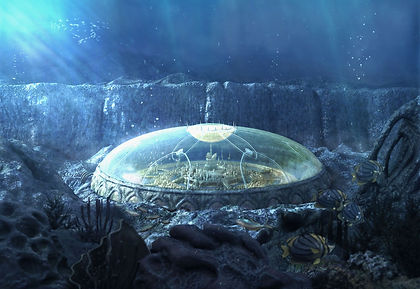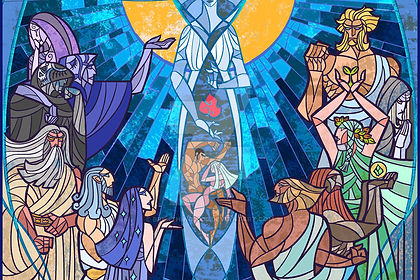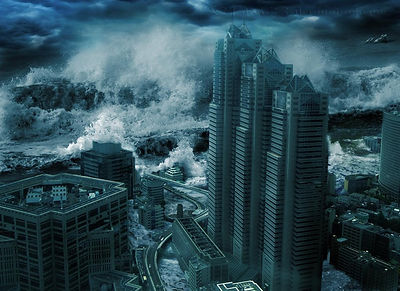
TIMELINE AND HISTORY
The First Age: 10,000 - 6,600 BC
Thousands of years ago, there was no such thing as technology or machines; people had barely begun harvesting wild grasses, agriculture was still in its infancy. Back then, Atlantis was but another nation among others, known for its wisdom and astutness as well as its peacefulness. It was a race of intellectuals, of scholars who studied the world, including the concept of magic.
While widespread and known across the whole globe, it was a little understood phenomenon, something few people knew of and even fewer were capable of using. Some saw it as a gift from the gods, others believed magic to be the devil's work and hunted those who could use it. And even those people barely understood what powers they wielded, what their abilities could have done if used correctly. Only the people of Atlantis, driven by their thirst for knowledge and curiosity, delved into magic and tried to understand its powers.
To their astonishment, scholars soon discovered the great properties possessed by this supernatural force and were able to use it as their source for inventions far superior to what other races could have built. With the help of magic, the Atlanteans quickly became the most advanced civilisation in the world. What they invented surpassed anything that existed at this time - from flying machines to medical devices, there was next to nothing they couldn't create. The Atlantean rulers Esiashal and Ane led their people into an age of prosperity. Millenia before other civilisations rose, the Atlantean race had become a nation so great that in 6,600 BC it had become the most powerful of all, its influence spreading as far as Asia. Through trade, the nation shared its knowledge with others, led by the diarchs' wish to use technology for the greater good.

The Second Age: ~6,500 BC
However, not everyone agreed with this course of action. A small but steadily growing organisation, calling themselves dasoshona and mostly consisting of priests, saw the diarchs' kindness and diplomacy as a weakness and wanted to bring about change. They believed that the other races would soon join forces and complot against Atlantis to steal its knowledge, machines and power, that they would burn the nation down and enslave its people. With campaigns and lies, they gained more and more influence, first winning over the majority of all priests, then spreading to the common people. They claimed that the diarchs and their followers had sold Atlantis to the enemy and that they have doomed the nation. Finally, in 6,500 BC, the opposition, led by Kaethe, succeeded in overthrowing the government.
It was a bloody, ruthless battle. Both sides lost many lives, though in the end the opposition stood victorious. For their crimes against the Atlantean people, Esiashal and Ane were publicly executed alongside their followers. The dasoshona now were in control and cut off all contact to the rest of the world, but even this isolation couldn't quiet their minds. Terrified of theft and conspiracies, their egoism, paranoia, hatred and hunger for power led them to bury Atlantis deep beneath the waters of the Atlantic Ocean. Protected by thick glass and with the help of machines, the city, its people and all knowledge of magic sunk to the bottom of the ocean and was thus erased from the surface world.
This event became known as the Great Flood or Mebelmok. There were varying interpretations about the Great Flood in the surface world, from the Bible which saw the flood as an act of God to teach humanity of faith, obedience and divine judgment, to Plato, who said the Great Flood was caused by the Gods in retaliation for the Atlanteans attempting to conquer Athens.
The opposition ushered in a new, great era of change.

The Third Age: 6,500 BC - 20th century AD
Ruthlessly, the new government hunted down the remaining members of the opposition, the few supporters of Esiashal and Ane that escaped execution, and established a regime of power and control. When citizens voiced out their uncertainty and doubts, the regime assured them these actions were necessary, for the traitors first had to be purged from the city before Atlantis could blossom. Though many still were unsure, they quickly began to believe in the words and promises of their leaders - after all, the priests had always known what was best for the Atlantean people, had been guided by the gods and their divine knowledge.
The members of dasoshona infiltrated all areas of life. Priests, high-ranking guards, teachers, scientists, scholars - every person of authority - either followed the new order or they were replaced by those loyal to the regime. These people had enough influence to help spread the regime's propaganda, to manipulate all written knowledge and censor everything that criticised the government - it allowed Atlantis' leaders to tightly control the flow of information. Those who still opposed had to stay in hiding and assimilate, otherwise they would disappear to never be seen again.
Another factor greatly strengthened the government's power over the common people - the introduction of Silitan, a concentrate that granted ordinary humans basic magical powers, greatly extended their lives and made them immune to almost all diseases in the world. Its distribution granted the regime even more popularity, allowed them to manipulate its citizens easily and had another convenient side-effect, its highly addictive nature which ensured the people required more and more of the drug.
After several thousand years, few remembered what Atlantis was like before. The regime changed history to serve their means, establishing something similar to a cult around their reign and letting themselves and their interpretation of the Atlantean religion be worshipped. It seemed like nothing could challenge their authority, break their control and overthrow them.

The Fourth Age: 1980-2015
Over time, however, a problem arose. The production of Silitan had cost many conductors their lives, their spilled blood staining Atlantis' white streets red. Little did the commoners know their miracle drug required the murdering of their own people. Citizens mysteriously disappeared and the public was told these individuals were traitors, spies, had broken the law and had to be locked away for the common good. For a long time few questioned this, but over the course of a few hundred years, the government suddenly faced a great problem: They ran out of conductors to kidnap and kill.
The number of conductors in Atlantis, and consequently the blood supply for Silitan, dwindled slowly. For the first time since they took over the city, the government saw itself facing the threat of loosing their power and being overthrown. One by one, people began displaying signs of withdrawal and the regime had trouble covering this up. At first, they could successfully hide it from the public, get rid of the sick and make them disappear, but the number of people showing symptoms rose too quickly and commoners began to notice something was going on. The voices of doubt and suspicion were getting louder, the opposition carefully reached out to the masses, trying to win them over.
Something had to be done or else the people would revolt and the city would fall. After long discussions, the regime came to a momentous decision: It was time for Atlantis to return to the surface, where they hoped to find conductors to continue their drug production. For more than twenty years, they prepared Atlantis' return to the surface. On 8th of June 2015, the time had finally come. With the help of powerful magic and machines, the city emerged from the waters, revealing its existence to the world.

Present day: June 2015
Shortly after Atlantis reappeared, its government made contact with the rest of the world. Though many were suspicious at first, the majority of the nations quickly came to accept Atlantis as a partner, for the Atlantean government offered to share their knowledge, technology and medicine. Each country had their own reasons for entering into negotiations with Atlantis; some believed they could gain an advantage over other nations, others were in for the money, the machines and superior technology while a few were genuinely interested and curious, wanted to benefit from Atlantis' knowledge to expand their own.
A few weeks have passed since Atlantis rose and the city has welcomed thousands - millions - of visitors from all over the world. To them, Atlantis is an utopia or paradise on earth. In truth, they have unknowingly set foot into an deathtrap. The government expertly hides its ugly truth from the foreigners, showing them only what it wants to be seen: the image of a perfect, idyllic nation. Citizens are told to share little or tell lies; most have always believed that the other nations want nothing but to exploit and destroy Atlantis from within, but now that they are confronted with their supposed enemy, they slowly begin to realise that their leaders haven't been completely honest with them...
In the meanwhile, the government frantically searches for dormant conductors to kidnap so they can continue the production of Silitan, secure their position as unchallenged leaders and prepare an attack on the rest of the world. They are certain that through killing all conductors in the world, they can finally produce enough energy to activate ashnecathak, a machine powerful enough to defeat the giant Raesashu and elevate the Atlantean people to the status of gods.
With the sudden disappearance of Valerie Bass, the daughter of an important politician, the Atlantean government faces the threat of their crimes being exposed. The opposition sees it chance at overthrowing the regime and helping Atlantis return to its former glory.

